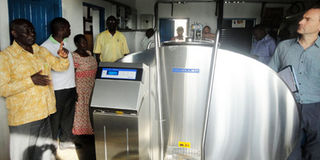Dairy coops get coolers to boost milk yields

Julius Mwebaze (left), a manager at the cooperative society, shows how milk delivered by farmers is received at the centre. Photos by Otushabire Tibyangye.
Dairy farmers in southwestern Uganda have a reason to smile after an intervention project that seeks to improve the industry by emphasising adding value to milk and increasing farmer involvement in the processes beyond milk production.
Supported by The Netherlands and Denmark governments, the €6.5m (Shs21b) project is being implemented by abiTrust. Under this initiative, Kashaka Dairy Farmers Cooperative Society (KDFCS) recently received 100 milk coolers. Each has a capacity of 5,000 litres.
The cooperative acquired them at a subsidised cost under the project’s stated objective to boost milk production and empower the framers in the cold chain.
The latter is the process which used to maintain optimal conditions of the milk such as temperature, freshness and quality during the transport, storage and handling stages.
“We are happy that now we own the coolers and this has put us at an advantage of bulk sale and determining our own price and who to sell the milk,” says Prof Isharaza, KDFCS chairman.
He adds that milk collection has improved as the dairy farmers have placed their trust in the cold chain. The milk is now being delivered in time.
To cater for the cost of acquisition of the coolers, the cooperative’s members are contributing towards the payment. It is Shs30 from the money they earn from each litre of milk they deliver.
While addressing the development partners’ representatives who were touring bulking centres, Prof Isharaza noted that the challenge they face is that the cold chain is dominated by traders and processors.
“The intervention is crucial and timely because ownership of the old coolers existed before privatisation of Dairy Corporation,” Isharaza explained. “The investor had started withdrawing these coolers after offering us poor milk prices.”
“We are happy with the progress. Out of 100 coolers, 70 have been installed with the 50 per cent contribution from the farmers. These coolers have improved milk quality and are energy efficient as the cooling time has reduced from eight hours to about two to three hours,” remarked Henny Gerner, from The Netherlands embassy. He was part of the team with representatives from abiTrust and Usaid that visited Kashaka Dairy Farmers Association.
He added that the farmers are now at an advantage because more milk has started entering the value chain. And some of the beneficiaries are school children under the school feeding programme. This has improved the performance of the children and has also attracted the pupils to stay at school.
Gerner pointed out that it is a good sign that banks like dfcu and Pride Micro-Finance are able to guarantee them favourable loans at a reducing rate.
Under this project, Uganda Crane Creameries Cooperative Union, of which KDFCS is a member, has also acquired 10 milk tankers. These will deliver milk from bulking centres to factories and other consumers within the time they need the milk.
Other than KDFCS, there are 30 other primary cooperative societies are yet to pick up their milk coolers.
However, dairy farmers still have challenges of low prices at farm gate, exploitation by middlemen, ensuring delivery to bulking centres, maintaining milk quality and lack of quality feeds.
Cows largely depend on natural pastures that have not been improved hence poor milk yields.
For the cows to produce more and give quality milk, they need supplementary feeding. This is expensive and most farmers keep indigenous breeds. These may not yield much on supplementary feeding and thus a loss to a farmer unless he has improved indigneous or exotic breeds.




